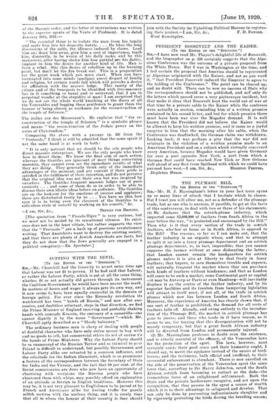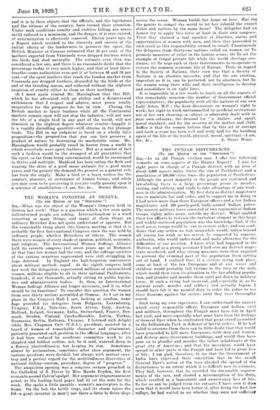THE PLUMAGE BILL.
(To THE EDITOR or THE " Seccoveron."1
Sra,—Mr. H. J. Massingham's letter in your last issue opens up so many lines of attack that I hesitate which to choose.
But I trust you will allow me, not as a defender of the plumage trade, but as one who is anxious, if possible, to get at the facts of this controversy, to deal with two or three of his statements.
(1) He declares that the ostrich-plume industry, which imported some £3,000,000 of feathers from South Africa in the year before the war, "is protected and encouraged by the Bill." Then why is it that every section of the trade in ostrich feathers, whether at home or in South Africa, is opposed to the Bill? The reasons, CO far as I can make out, that the feather industry is an organic whore, and that to attempt to split it up into a fancy plumage department and an ostrich plumage department, is, in fact, impossible; that you cannot suppress the former without at once dislocating the latter; that London cannot remain the headquarters for ostrich plumes unless it is also at liberty to deal freely in fancy feathers; that buyers, to save themselves trouble and expense, will naturally frequent the market where they can purchase both kinds of feathers without hindrance; and that as London will cease to be such a market, some Continental port or capital —it may be Antwerp or Paris or even Hamburg—will inevitably displace it as the centre of the feather industry, and by its superior facilities and its freedom from hampering legislation will attract to itself most, if not all, of the trade in ostrich plumes which now lies between London and South Africa. Moreover, the experience of America has clearly shown that, if one sort of feather is nrohibited, the demand for all sorts of feathers falls off. Already, and owing entirely to the introduc- tion of the Plumage Bill, the market in ostrich plumage has gone to nieces; and those who trade in it have reason, as it seems to me, for fearing that this disorganisation will not be merely temporary, but that a great South African industry will be diverted from London and permanently injured.
(2) Mr. Massingham professes to doubt even the existence, and is utterly scornful of the efficacy, of the Venezuelan laws for the protection of the egret. The laws, however, most certainly exist; their good sense and their humanity ought, I should say, to merit the applause instead of the sneers of bird- lovers; and the testimony, both official and unofficial, to their successful enforcement is abundant. There is now enrolled on the side of the preservation of the Venezuelan egret the same force that, according to Sir Harry Johnston, saved the South. African ostrich from becoming as extinct as the dodo—the tremendous force of an enlightened self-interest. Both the State and the private landowners recognise, and act upon the recognition, that they possess in the egret a source of wealth which it is to their advantage to safeguard and develop. That can only he done by preventing indiscriminate slaughter and by rigorously protecting the birds during the breeding season; and it is to these objects that the officials, and the legislators and the citizens of the country, have turned their attention. Under such conditions cruelty and reckless killing are neces- sarily reduced to a minimum, and the danger, if it ever existed, of extermination is effectively removed. Eleven years ago, in a Report which testified to the sincerity and success of the initial efforts of the landowners to preserve the egret, the British Minister at Caracas estimated that 25 per cent. of the feathers exported from Venezuela were dropped feathers which the birds had shed naturally. The estimate even then was considered a low one, and there is no reasonable doubt that the percentage to-day is very much higher, and that at least three- fourths—some authorities even put it at between 80 and 90 per cent.—of the egret feathers that reach the London market from Venezuela are dropped feathers, discarded by the birds at the end of the breeding season, and collected without the slightest suspicion of cruelty either to them or their nestlings.
(3) I must again remind Mr. Massingham that this Bill, which he has advocated with an ability and a disinterested enthusiasm that I respect and admire, must prove totally
inoperative for the purposes he has in view. Closing the British market to fancy feathers while all the Continental markets remain open will not stop the industry, will not save the life of a single bird in any part of the world, will not diminish in the slightest degree whatever cruelty—happily it is a rapidly dwindling quantity—still obtains in the plumage trade. The Bill in my judgment is based on a wholly false proposition—the proposition that you can best preserve a product of nature by destroying its marketable value. Mr. Massingham would probably recoil in horror from a world in which everybody wore egret feathers. But as a matter of fact such a fashion would be ihe strongest of all guarantees that the egret, so far from being exterminated, would be encouraged to thrive and multiply. Mankind has been eating the flesh and wearing the skins of a good many animals for a good many years, and the greater the demand the greater as a general rule has been the supply. Make a bird or a beast useless for the comfort, pleasure, or sustenance of human beings, and while you may seem to be preserving it you arc really passing upon it a sentence of annihilation.—I am, Sir, &c., SYDNEY BROOK&







































 Previous page
Previous page